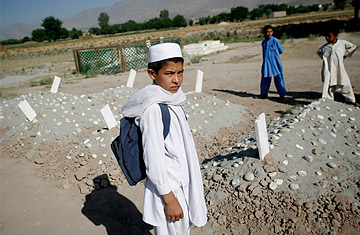
An Afghan boy stands over fresh graves at a family cemetery near Koshkaky village, in eastern Afghanistan's Nangarhar province, the scene of a deadly early morning raid by U.S. special forces
Nazir Ahmad says he heard gunfire coming from a guardhouse in the early hours of Friday, May 14, outside the large adobe compound he shares with nine families. Thinking that thieves were trespassing, he and several men ran into the ink-black courtyard, where they were struck down by grenade explosions and gunfire. "They were shooting lasers," says Ahmad, 35, misidentifying bullets as the laser sights on his assailants' weapons. Shrapnel flew into his cheek and hit his 18-month-old daughter in the back. A neighboring family fared even worse: within seconds, a father and four sons lay dead.
Local witnesses interviewed by TIME say the nighttime raid by U.S. forces killed eight residents of this sunbaked farming village in eastern Afghanistan. The U.S. military insists that the operation in Koshkaky, about nine miles (14 km) west of Jalalabad, targeted active insurgents in the area, including a Taliban subcommander who was killed. Two wounded fighters were seized, along with machine guns and "communications equipment," the military said in a statement without offering casualty figures. (Afghan police are conducting their own investigation.)
But ordinary Afghans are more inclined to believe the worst. As word of the incident spread Friday morning, street protests erupted, as hundreds of people burned tires and threw stones to chants of "Death to America," "Long live the Taliban" and antigovernment slogans. When a crowd tried to storm the district police center, officers responded with gunfire that killed at least one protester.
Since General Stanley McChrystal took command of international forces in Afghanistan last summer, restrictions on airstrikes have sharply curbed the incidence of civilian deaths, which have fueled public outrage and friction between the Afghan government and the U.S. Observers, however, point to a concurrent rise in night raids by special-forces units. According to United Nations and Afghan government estimates, night raids accounted for more than half of the 600 civilian deaths by coalition forces last year. After a series of mishaps, McChrystal issued a new tactical directive in late January to reduce casualties and be less invasive. He mandated that "wherever possible," Afghan authorities and local elders should be notified ahead of time and that Afghan security forces take the lead.
But McChrystal's guidelines appear to have been applied more to regular infantry units than to special forces, whose officers fear that their covert missions could be compromised by such consultations. Nor has the involvement of Afghan troops helped reduce fatal mistakes. For instance, in a Feb. 12 raid in Paktia province, special forces barged into a family celebration of a newborn baby, killing an Afghan police officer, his brother, two pregnant women and a teenage girl. NATO initially claimed that a joint Afghan-coalition operation had discovered the bodies of three women bound and gagged after a firefight with militants. But as contradictory evidence mounted, some reports suggested that a U.S. officer had been sent to personally apologize for the shootings and offer compensation payment to the relatives of the deceased.
Some Afghans ssy the errant raids may be directed by misinformation passed to the Americans to settle local feuds. On April 29, the brother-in-law of Afghan lawmaker Safiya Sidiqi was shot dead in a night raid on her family home in Surkh Rod district. Sidiqi says her brother had called earlier, saying thieves were outside the house. When she checked with police, she said they informed her that American forces were conducting an operation there. The U.S. military later asserted that the victim was a "Taliban facilitator" who emerged from the home with a shotgun, displaying lethal intent and refusing orders to drop the weapon. Lieut. Colonel Joseph T. Bresseale, a spokesman, dismissed claims that the weapon had been wielded in self-defense against suspected criminals, calling it a common excuse used by night-raid targets.
But residents of Koshkaky village who witnessed the latest American raid stick by their story. Mohammad Siddiq Bismil says it is normal for isolated farmers to keep weapons on their property, and when they heard gunfire, he says, several men gathered their rifles and two Kalashnikovs — for which they had permits — and fired several shots into the air as a warning. Seconds later, some of the men were gunned down by soldiers who had scaled 15-ft. (5 m) walls on several sides and blasted through a rusty gate. "Instead of announcing themselves, they shot first," Bismil claims. The U.S. military says the firefight began after the men refused to step outside.
When the dust settled, villagers said, they were held inside the compound and interrogated until after dawn by American and Afghan soldiers. They maintained that they had no idea who Qari Shamshudin, the alleged Taliban subcommander, was. Their rifles and cell phones were confiscated, they alleged, and two injured men, said to be truck drivers, were taken away. Though reporters were not allowed inside the family compound to explore the scene of the shootings because women were mourning in the courtyard, there were dried streaks of blood outside and broken glass still peppered the ground. Bullet holes were visible in car windshields.
A short drive down the road back to Jalalabad, a gaggle of young men were gathered at a cemetery around one of five fresh graves, palms open in prayer. Assadullah, a 19-year-old student, listed the names of his former neighbors, the father and sons from the village: Sayid Rahim, Shafiullah, Shams, Zikruddin, Rasul Khan. "These are our brothers, not Taliban," he says, "The U.S. is telling lies. We will fight the Taliban — and [the Americans] too, if we must."
This story was reported with a grant from the Pulitzer Center on Crisis Reporting.
